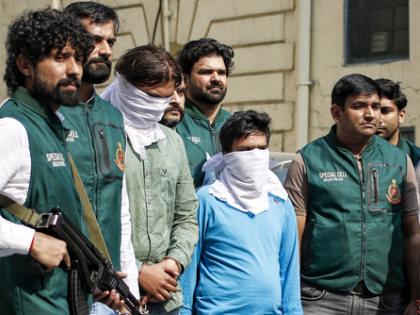Inside Islamic State’s digital revival: Syrian handlers, AI and honey traps are targeting Indian youth
By IANS | Updated: October 25, 2025 16:30 IST2025-10-25T16:29:09+5:302025-10-25T16:30:13+5:30
New Delhi, Oct 25 The arrest of Md Adnan Khan, alias Abu Muharib (19), from Delhi's Sadiq Nagar, ...

Inside Islamic State’s digital revival: Syrian handlers, AI and honey traps are targeting Indian youth
New Delhi, Oct 25 The arrest of Md Adnan Khan, alias Abu Muharib (19), from Delhi's Sadiq Nagar, and Adnan Khan, alias Abu Mohammad (20), from Bhopal in connection with an Islamic State related case signals that the online radicalisation wing of the outfit is extremely active.
The Islamic State which has a stronger online presence when compared to its onerous strengths, has adopted several strategies to radicalise people.
Investigations into the Delhi case have so far revealed that the duo were radicalised online and were reporting to a handler in Syria.
The fact that the duo were being handled from Syria clearly suggests the group's resurgence in the country.
Although the Islamic State was defeated in Syria, it has made a strong comeback.
The fact that it has already carried out 115 attacks this year as opposed to the 72 last year is an indication that the group has emerged stronger.
Intelligence Bureau officials say that the India operations are being run out of Syria.
A proper mechanism was set in place by Shafi Armar, who was killed in a strike a couple of years back.
Currently it is his wife Rabiya Armar who is in charge of the module.
She had been relocated to the Al-Hawl camp in Syria following her husband’s death. Investigations show that the Islamic State is running Artificial Intelligence-powered and conventional radicalisation modules online.
The AI modules are focussed on putting out propaganda content in multiple languages.
The conventional modules, too, are active and this involves an actual person spreading propaganda online.
The Islamic State also has a module that is involved in honey trapping. This module which is under the complete control of Rabiya has managed to trap several Indian youths.
Here, investigations have found that the youth are enticed and once they fall into the trap, they are radicalised and then instructed to work for the outfit.
The Indian agencies have also noticed a massive flow of funds from donors and sympathisers which are being invested into these modules.
The module controlled by Rabiya is focussed only on Indian operations. While some are asked to carry out attacks, others are tasked with carrying out radicalisation and recruitment programmes.
The sudden surge in operations by the Islamic State has become a headache for the security agencies. The outfit is running its campaign differently and there is very little action on the ground. It has been completely relying on online methods and this has made tracking activities extremely tricky.
Another pattern that has come to light is that some of the youth who have been honey trapped have been asked to transfer money to the outfit. The money has been transferred to multiple bank accounts and the amount is meant to fund terror activities.
An official said that the Islamic State remains the most dangerous organisation for the way in which it functions. Its style in India is to capture the minds of gullible youth.
The spread of the ideology among a large number of people is dangerous as it brings about a change in society. While at first they would just focus on radicalisation, over a period of time they would try and carry out big attacks, the officials explain.
The other cause for worry is that many could turn into lone wolves, a brand of terrorists who are extremely difficult to track.
The security officials are also keeping a close watch on the activities of the Islamic State Khorasan Province (ISKP) that operates from Afghanistan and Pakistan.
Now, with Islamabad seeking support of the ISKP to battle the Tehreek-e-Taliban Pakistan (TTP), there is a larger worry that Pakistan may also use the outfit to carry out strikes in India.
The ISKP has for long wanted to further its ambitions in India and this new partnership may just give it the nudge to do so.
Disclaimer: This post has been auto-published from an agency feed without any modifications to the text and has not been reviewed by an editor
Open in app